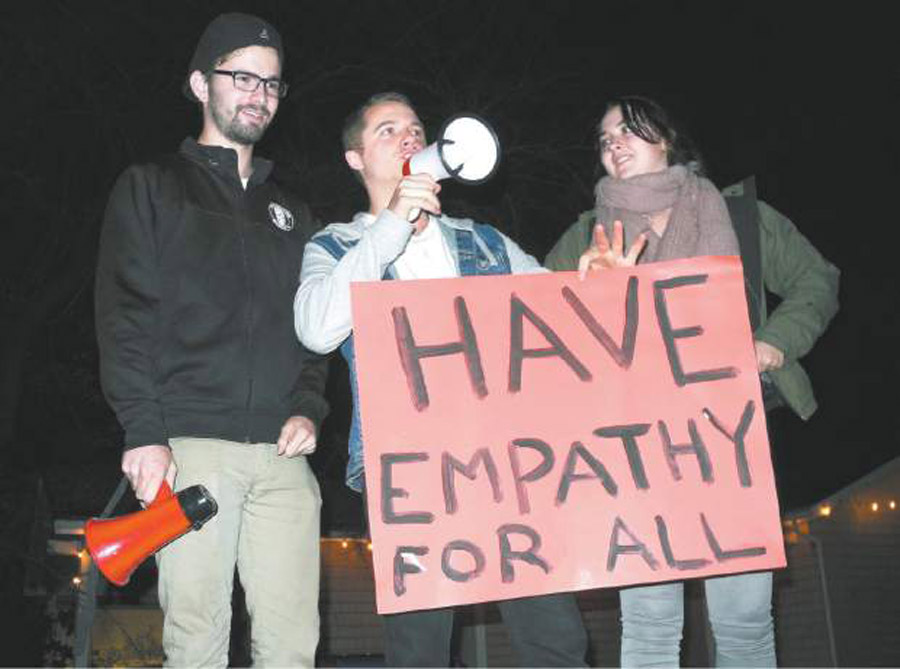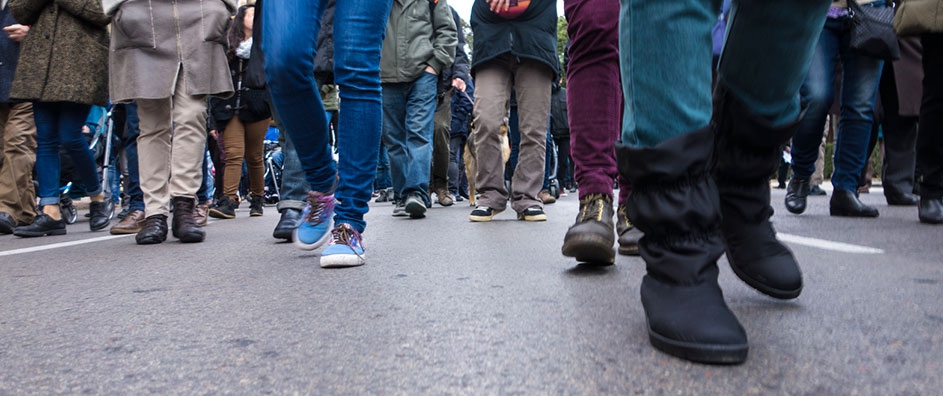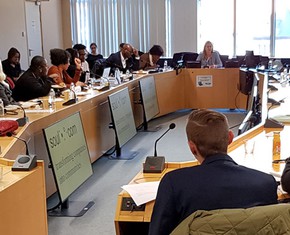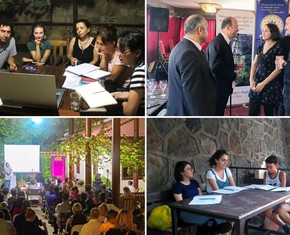The views expressed in our content reflect individual perspectives and do not represent the authoritative views of the Baha'i Faith.
After the American election, three young millennials in my town decided to hold a protest rally—but it turned into a march for unity.
At first, the three organizers, ages 16, 18 and 22, created an event they initially called “March Against Trump. No Violence. No Hate. Just Love.”
But then, when the day of the march arrived, the event unexpectedly changed. First, the organizers realized that their event’s original name contained a fundamental contradiction in terms. Then they realized that more people—and more diverse people—turned out than they anticipated. Marchers of all political persuasions—people who had voted for every presidential candidate—held signs and lined both sides of the town’s main street for several blocks. So the organizers made an on-the-spot decision to “promote the positive rather than dwell on the negative and celebrate inclusion, not divisiveness.” – Rally Organizers Push Unity over Divisiveness, Stephen Roberson, The Union newspaper, 16 November 2016.
“We were not protesting Trump’s election,” one of the organizers told a local newspaper reporter. “We were protesting the normalization of bigotry and hate, and we lined Broad Street to show we will fight those injustices with love and acceptance.
“The three [organizers] agreed,” the newspaper article concluded, “it’s important not to generalize Trump supporters as bigoted or hateful or even criticize them for their political beliefs… We had a civil discussion about everything, and it was positive. There was no blaming. We all agreed that everyone should just care for each other.” – Ibid.

The three organizers of the unity-march. From left, Christian Jewell, Jerron Steele and Ivy MacLeod.
This article stood out amidst the welter of negative media coverage, not only because of its emphasis on unity, but because it shows that people want to overcome their differences and get past the divisiveness our political and governmental systems tend to produce. In this case, no one used the word “unity” to silence dissenting voices—instead, the marchers actually forged unity out of division by focusing on love.
That’s not the way partisan politics is supposed to work. Partisan political systems separate us into various ideologies, camps or interest groups, and then pit us against one another. Many of us buy into that kind of thinking, and it impels us to become rabid Democrats or Republicans, conservatives or liberals, Whigs or Tories, or whatever divisions the system allows. But let’s be honest: how many people actually agree with absolutely everything any one political party espouses? You might be socially progressive and fiscally conservative, or vice versa. You might be a Green Party supporter for one candidate and support the Pirate Party for another. (Yes, there really is a Pirate Party, which started in Sweden and spread to other European countries. In Iceland’s last election, the Pirates won 15% of the vote.)
Political parties, then, intentionally function as agents of disunity, not cohesion or cooperation.
In the United States, the deep divisions between the two major political parties have generated an enormous amount of animosity and anger recently. After the 2016 election, reports of verbal harassment and hate crimes rose rapidly, according to multiple sources including U.S. Justice Department. The Southern Poverty Law Center logged reports of more than 2000 such incidents in one 24-hour period.
In just one example of the heightened tension and its post-election causes, Andrew Anglin, a leader of the extremist “alt-right” movement, publicly called for mass intimidation of those he labeled “brown people” on a well-known neo-Nazi website, The Daily Stormer. “I am of course against any violence against these people,” Anglin wrote. “However, I do think you should yell at them. We want them to feel that everything around them is against them. And we want them to be afraid.”
This horrific racism, verbal violence and open antagonism has no place in any civilized society. But our political process has allowed—and yes, even sometimes encouraged—such hatred to come out of the closet. By attacking “political correctness” and demonizing those who try to protect the feelings and the rights of others, movements fueled by hate have been emboldened to more openly state their toxic views. This has resulted in a new outbreak of harassment, intimidation, hate speech and actual violence. As a result, we’ve all learned that the thin veneer of civility in our society is very fragile, and subject to easy destruction.
Baha’is believe that we can only address and deal with such toxic incivility and hatred by elevating the spiritual conditions in our cultures, and by emphasizing and promoting real unity. Toward that end, Baha’u’llah asked humanity to “Be fair in thy judgment, and guarded in thy speech.” (Epistle to the Son of the Wolf, p. 93) He compared the tongue to “a smoldering fire,” and cautioned everyone to be spiritually correct—to “refrain from slander, abuse and whatever causeth sadness in men:”
We exhort you, O peoples of the world, to observe that which will elevate your station. Hold fast to the fear of God and firmly adhere to what is right. Verily I say, the tongue is for mentioning what is good, defile it not with unseemly talk. God hath forgiven what is past. Henceforward everyone should utter that which is meet and seemly, and should refrain from slander, abuse and whatever causeth sadness in men. – Baha’u’llah, Tablets of Baha’u’llah, pp. 219-220.
If we follow those spiritual admonitions and laws, and refrain from defiling our tongues with unseemly talk, we can create a civil society that is truly civil. That, of course, is the beginning of unity.
You May Also Like
Comments

















(Talking about President Trump as of Nov 2020 in so many ways!)